Crossing Boundaries
With Music
By Debra Wilkinson
Caroline Coccoli loves
to make music. Last year she played first violin in her orchestra
and sang a brief solo with the Annapolis Symphony Orchestra. This
year she's singing in the opera "La Boheme" and planning to play
works by Mahler and Wagner. Her skill is a result of years of
hard work and serious study. Oh, and Caroline is 10 years old.
 This
talented performer is one of several young people who participates
in some of the local musical organizations for children in Annapolis.
Two of these organizations, the All Children's Chorus of Annapolis
(ACCA) and the Chesapeake Youth Symphony Orchestra (CYSO), have
her as a returning member this year. This
talented performer is one of several young people who participates
in some of the local musical organizations for children in Annapolis.
Two of these organizations, the All Children's Chorus of Annapolis
(ACCA) and the Chesapeake Youth Symphony Orchestra (CYSO), have
her as a returning member this year.
ACCA is a non-profit organization of 55 singers, ages 7 to 14,
who perform multicultural music in and around Annapolis. It was
founded three years ago by Liz Barrett, a retired computer programmer,
who wanted to bring kids together to encourage tolerance among
different groups of people or, to put it her way, "to help change
the world."
 Barrett
had been active in community service and thought that a children's
choir consisting of kids from different churches would be a good
way to bring the community together. She soon learned that she
had to modify that plan. "When I tried to actually talk to choir
directors, I quickly realized that this wasn't going to work.
First of all, not everyone wants their kids exposed to other theologies.
Also, I found that you have to sing sacred music in a church,
and I certainly didn't want to sing sacred music only. So thus
evolved a community chorus." Barrett
had been active in community service and thought that a children's
choir consisting of kids from different churches would be a good
way to bring the community together. She soon learned that she
had to modify that plan. "When I tried to actually talk to choir
directors, I quickly realized that this wasn't going to work.
First of all, not everyone wants their kids exposed to other theologies.
Also, I found that you have to sing sacred music in a church,
and I certainly didn't want to sing sacred music only. So thus
evolved a community chorus."
Barrett had never worked with kids before and was a bit nervous
about the prospect. "I've never been a natural lover of children
and dogs. I liked my own children, and we had dogs, but I'd never
been an 'ooh-er' over babies. I'm also a supreme music critic
and wondered if I'd really have the tolerance and patience to
work with kids. I am absolutely amazed to find that I love [it]."
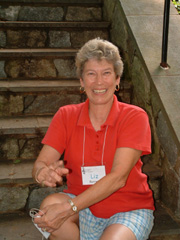 She's
also surprised that they love working with her. "I make them work
hard---there's no getting around that---but they really do like
it. It's amazing to be surrounded by kids who are hugging me." She's
also surprised that they love working with her. "I make them work
hard---there's no getting around that---but they really do like
it. It's amazing to be surrounded by kids who are hugging me."
Mary Armstrong, mother of busy Caroline, has two kids in ACCA
and says of Barrett, "She has a tremendous amount of energy. The
thing that's best about her is that she says exactly what she
thinks. She demands a lot of the kids and gets a lot out of them."
Barrett is pleased with the quality of the chorus and continues
to use it as a way to bring people together and foster open-mindedness.
ACCA is a way for her to act on a local level to help children,
parents and the audience learn about people who are different
from themselves. "I look at this country and see the hate crimes,
the intolerance for so many people, intolerance for people they
don't know anything about.
"Annapolis is in no way an integrated community. You do see it
to a certain extent, but we have a long way to go. That's part
of why I felt I had to do something. I just felt that these kids
growing up being tolerant of each other, learning to respect each
other...that it's necessary. Kids can be in the same school together,
but if they're not taught to respect one another, then it doesn't
get them loving each other. Every once in a while in the chorus
a child will say something nasty to someone else, and I just will
absolutely not allow that."
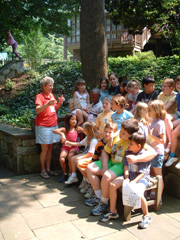 Barrett
tries to make ACCA as diverse as possible, both in membership
and in the material they perform. She's used musical pieces that
range from light-hearted Disney numbers to Angolan, Japanese and
Czechoslovakian songs (often sung in the original language), to
classical works by Handel and Brahms. But diversity in the group's
membership is a bit more difficult to attain. Barrett says, "I
don't have many kids from disadvantaged backgrounds, and I'd like
to have more." Barrett
tries to make ACCA as diverse as possible, both in membership
and in the material they perform. She's used musical pieces that
range from light-hearted Disney numbers to Angolan, Japanese and
Czechoslovakian songs (often sung in the original language), to
classical works by Handel and Brahms. But diversity in the group's
membership is a bit more difficult to attain. Barrett says, "I
don't have many kids from disadvantaged backgrounds, and I'd like
to have more."
Still, the reputation of ACCA has grown. They do several performances
a year, including spots with the Annapolis Symphony Orchestra
and more at the Martin Luther King breakfast. Most recently, they've
been invited by Anne Arundel Community College to sing the children's
choral part in Puccini's "La Boheme" on Oct. 10 and 12.
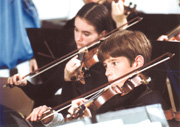 On
the other end of the spectrum, there's the Chesapeake Youth Symphony
Orchestra, which takes a more traditional approach to bringing
children together to create music. The 13-year-old organization,
also non-profit and mostly volunteer, instructs and showcases
young, serious, classical musicians, ages 8 to 18. The group consists
of two full symphony orchestras, two string orchestras and two
flute choirs. On
the other end of the spectrum, there's the Chesapeake Youth Symphony
Orchestra, which takes a more traditional approach to bringing
children together to create music. The 13-year-old organization,
also non-profit and mostly volunteer, instructs and showcases
young, serious, classical musicians, ages 8 to 18. The group consists
of two full symphony orchestras, two string orchestras and two
flute choirs.
Unlike the mix of skill levels in ACCA, CYSO members are, for
the most part, experienced players who must invest a great deal
of time and money to participate. The players practice an average
of one to three hours every day, in addition to private lessons
and weekly rehearsals. Parents can spend anywhere from a few hundred
to several thousand dollars a year to support their child's participation
in a serious orchestra like CYSO. Fees to join are only a couple
of hundred dollars a year, but there's no limit to how much a
parent can spend on instruments and lessons.
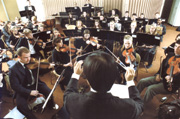 Time
is another investment parents need to make if their child is to
study seriously. Kathy Swekel, executive director of CYSO and
mother to one of the performers, says, "You drive them to their
lessons, you drive them to their orchestra, you drive them to
their performances, you drive them here, there and everywhere,
and it takes large chunks of your time. If you have a kid like
mine who is in three different organizations, it becomes a full
schedule. A lot of times the parent has to invest as much as the
kids." Time
is another investment parents need to make if their child is to
study seriously. Kathy Swekel, executive director of CYSO and
mother to one of the performers, says, "You drive them to their
lessons, you drive them to their orchestra, you drive them to
their performances, you drive them here, there and everywhere,
and it takes large chunks of your time. If you have a kid like
mine who is in three different organizations, it becomes a full
schedule. A lot of times the parent has to invest as much as the
kids."
So, why do these families go through all of this? To Swekel, the
desire that dedicated musicians of all ages have to do what they
love takes precedence over any inconvenience. "It's an overwhelming,
uncontrollable way of living. Some people have a conscious 'I-want-to-be-a-
music-major' element to them. But behind that, there's a knowledge
that this is the thing you have to do to be happy."
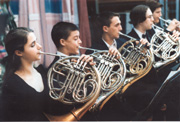 Julien
Benichou, a world-renowned conductor who has just this year joined
CYSO as their music director, says that when he first encountered
the group as a guest conductor during a rehearsal, "I came and
conducted and was immediately struck with the group's focus and
interest in music-making. Julien
Benichou, a world-renowned conductor who has just this year joined
CYSO as their music director, says that when he first encountered
the group as a guest conductor during a rehearsal, "I came and
conducted and was immediately struck with the group's focus and
interest in music-making.
"I would say that these kinds of players can perform just as well
as a professional group. It just takes more practicing and more
rehearsing. Of course, when you play a symphony for the first
time, it is certainly exciting, and one is able to put lots of
energy into the preparation and the performance. But one has to
learn to manage his concentration and energy---it is sort of like
climbing a mountain for the first time." His confidence in the
group shows in his musical choices for the coming season, which
include a difficult selection from Mahler, as well as pieces from
Ives, Mozart and Wagner.
 Like
Barrett, Swekel recognizes music's power to communicate across
language and other boundaries. "You can sit at a table with people
who don't speak your native tongue, but if you play a piece, they'll
know exactly what you're saying. It's a person-to-person, deeply
individual emotional experience." Ultimately, that is one of the
greatest rewards that these students receive when they commit
themselves to music. Like
Barrett, Swekel recognizes music's power to communicate across
language and other boundaries. "You can sit at a table with people
who don't speak your native tongue, but if you play a piece, they'll
know exactly what you're saying. It's a person-to-person, deeply
individual emotional experience." Ultimately, that is one of the
greatest rewards that these students receive when they commit
themselves to music.
Young Caroline, however, doesn't let her commitment to these two
demanding groups get in the way of the other things she likes
to do, like participating in her school's math club, reading all
the Harry Potter books, and hanging out with friends. It's her
mom who can get overwhelmed. "Sometimes I feel panic that I can't
drive everywhere!" says Armstrong.
For more information on ACCA, call Liz Barrett at 410-263-9191.
For information on CYSO, call Kathy Swekel at 410-263-2664.
 Debra
Wilkinson is a recent graduate of St. John's College, where
she read a selection of the great books of Western civilization.
She plans to move to Korea to teach conversational English. Debra
Wilkinson is a recent graduate of St. John's College, where
she read a selection of the great books of Western civilization.
She plans to move to Korea to teach conversational English.
|
Back
|

